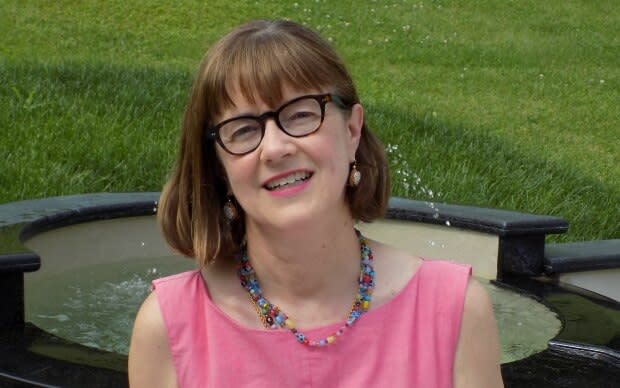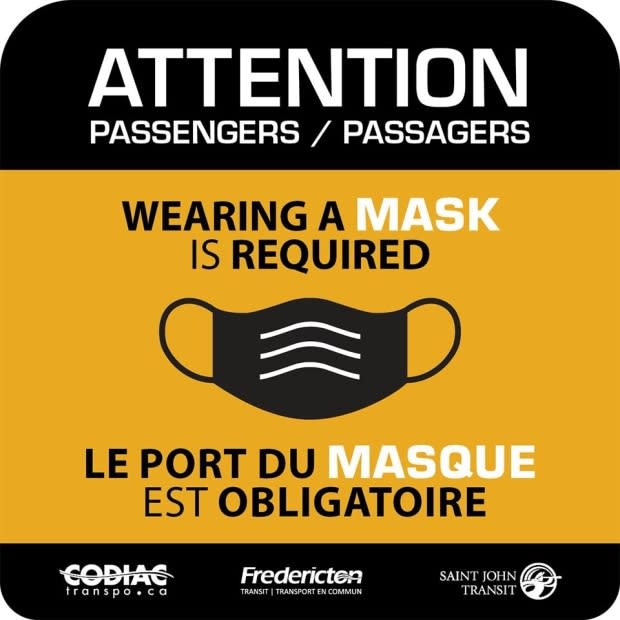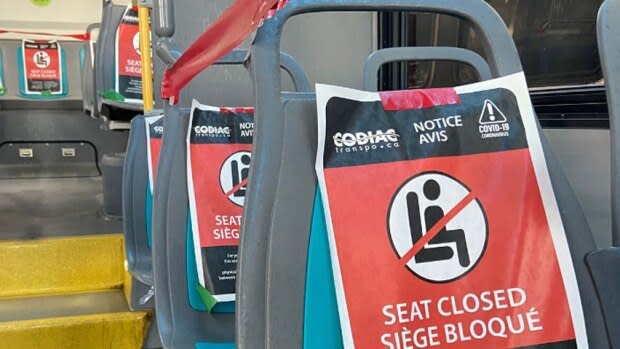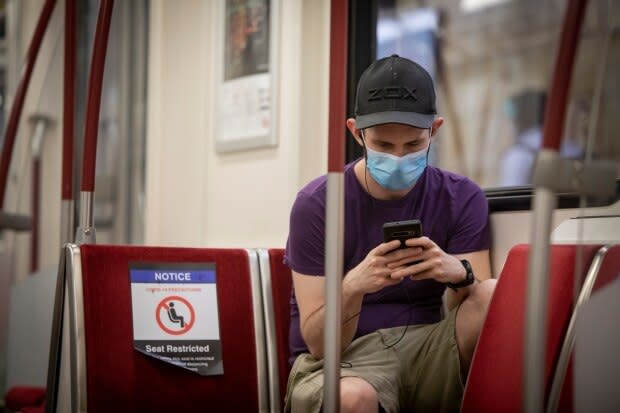Medical professionals call on governments to make masks mandatory in public
As provinces balance the need to reopen their economies while keeping COVID-19 at bay, medical experts are urging governments to make masks mandatory in public places.
A group of doctors has written an open letter to government and public health leaders asking that people be required to wear masks in all indoor spaces outside the home, in crowds, and on public transit.
Calgary family doctor Amy Tan is one of the organizers of Masks4Canada. She said a recent study in a German city shows that within three weeks of mandating masks, the spread of COVID-19 dropped by 40 per cent.
"Asymptomatic spread is actually much more of an issue than we had thought at the beginning," she said.
"Anywhere from 20 to 40 per cent of cases could be from people who didn't have any symptoms."
To date, more than 1,500 medical professionals have signed the group's petition, including at least one doctor from New Brunswick.

Sandra Hyde also believes that masks should be mandatory across Canada.
Hyde, an associate professor of anthropology and social studies of medicine at McGill University who has studied the spread of HIV/AIDS in China, says we can learn from Asia's widespread acceptance of mask wearing.
"I kind of see masks as the new condom. In the early days of AIDS, we had no antiretrovirals. We had no way of really stopping the infection other than some behavioural modifications ... And I think masks are very similar."
Hyde thinks governments are slowly moving toward making masks mandatory, but the differences between jurisdictions just leads to confusion. Making them mandatory everywhere will take the guesswork out of it, she said.
"It has to be mandatory," said Hyde. "I think you make it culturally mandatory. You make it mandatory without saying, you know, 'We're gonna fine you $3,000 if you're not wearing them.'"

Instead of "policing" compliance, she said people would be denied entry or services if they're not wearing a mask.
"If you make masks mandatory, 'Look, you can't get into a store without a mask,' people mask themselves."
In the beginning, she said store owners may have to provide masks to anyone who doesn't have one — similar to bags at the grocery store.
Saint John store owner Sue Mullaly said she hasn't noticed a reluctance to wear masks. When she reopened at the end of May after the shutdown, she immediately required customers to wear a mask.
A sign at the entrance of Decor8 Finishing Touches, on the ground floor of Brunswick Square, informed customers of the new requirement and offered to provide a mask if they didn't have one.
"We've had no issues with it at all," said Mullaly. "I think some of that might be because if they don't have a mask, I offer to give them one."
She remembers only once that a customer walked away when told they needed to wear a mask.
Mullaly estimates that at least 90 per cent of customers bring their own masks, and she hasn't given one away in a couple of weeks.
They might not always have it on, but they comply when Mullaly asks them to put it on.

In one of the early measures of mask compliance in New Brunswick, transit users in Moncton have also been wearing masks.
Last week was the first week that the transit authorities in all three of New Brunswick's largest cities "required" masks.
City spokesman Austin Henderson said masks are not mandatory, so drivers are not preventing people from getting on buses.
Transit supervisors conducted spot checks on routes throughout the week and reported a compliance rate of at least 85 per cent.
Other communities across Canada have started making non-medical face masks mandatory on public transit — or even in businesses or indoor spaces — to curb the spread of COVID-19.
Masks4Canada, which is made up of health-care and other professionals, is calling for more laws making masks mandatory in certain circumstances.

The group has written an open letter to federal health officials asking them to recommend such laws to lower levels of government for:
All indoor spaces outside the home, such as schools, libraries, community centres, stores and restaurants.
Crowded areas, both indoors and outdoors, including protests and busy parks or trails.
Public transit.
According to its website, the group's mission is "to let all levels of the Canadian government and the public know that Face Coverings/Masks are ESSENTIAL to fight the transmission of COVID-19, in hopes of containing and stopping the pandemic."
The group believes that masks, when combined with physical distancing and hand hygiene, "will help save lives and the economy."
"Community transmission of COVID-19 is still there, the risk has not decreased," Tan said. "So as people start interacting with each other we really want to keep people safe."
In its letter to government, the group cites several reports that say wearing masks is most effective when compliance is high.
One report says a minimum of 80 per cent usage is needed to have a significant impact.
The group also cites a recent poll that said only 48 per cent of Canadians wear masks.
Other polling by the same company reveals that 58 per cent of Canadians think masks should be mandatory when in public and confined spaces.

The survey also compared mask usage with the United States, where respondents are more likely to report wearing a mask.
When grocery shopping, for example, 81 per cent of Americans said they wear a mask, while only 56 per cent of Canadians reported wearing a mask. For the pharmacy, it was 65 per cent versus 52 per cent; using public transit, 33 per cent versus 22 per cent; working in their office/workplace, 35 versus 22 percent; and going for a walk, 36 versus 14.
Masks in New Brunswick
In New Brunswick, masks are mandatory only if physical distancing is not possible, explained Health Department spokesperson Bruce Macfarlane.
Section 12 of the mandatory order states that if a person finds themselves in a position where physical distancing is not possible, they have to either wear a mask or "remove themselves promptly from the location."
The section doesn't go as far as Masks4Canada is calling for, but in a statement sent on Monday afternoon, New Brunswick's chief medical officer of health implied that the province could move in that direction if there's a surge in cases.
"Section 12 of the mandatory order clearly outlines the province's mask policy," said Dr. Jennifer Russell. "When it comes to masks, everyone should be carrying a mask with them when out in public and should have it handy if they cannot guarantee physical distancing. This guidance is based on the current situation in the province. If there is a surge in cases or evidence of community transmission, this guidance could change."
Macfarlane added, "Mask recommendations will vary from jurisdiction to jurisdiction based on a number of factors, [including] community transmission and number of cases."
In June, the New Brunswick government backtracked on a decision to make wearing masks mandatory for people entering any buildings open to the public.
The new rule was scrapped just one day after it was announced.
"It was not intended to put a mask on everybody who walked in the door. It was intended that everyone would have a mask with them so they were able to put it on when needed," said Premier Blaine Higgs explained at the time.
The province continues to say people must wear masks if they are in a public space where physical distancing cannot be maintained.
Children under the age of two, children attending a licensed early education and child care facility and anyone unable to wear a face covering for medical reasons would have been exempt from the new rule. They are also exempt from wearing masks on buses.
National recommendation
The Public Health Agency of Canada recommends wearing a non-medical mask or face covering in public places, especially crowded ones, when physical distancing — keeping a distance of two metres from other people — isn't possible. Such places include stores, shopping areas and public transportation.
The idea is that masks can reduce the spread of respiratory droplets you produce when breathing, talking, coughing or sneezing. The recommendation was put in place because of growing evidence that people can transmit COVID-19 through such droplets before showing symptoms.


